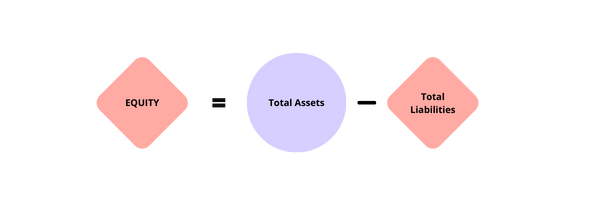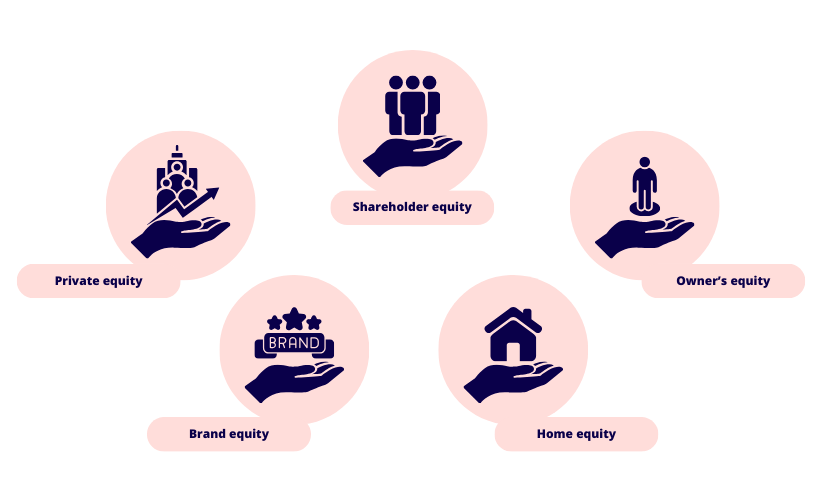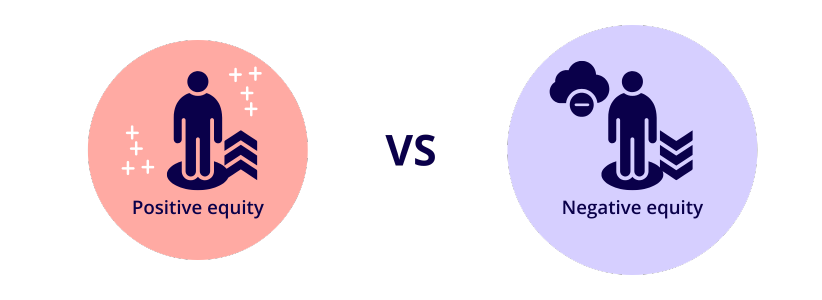Equity definition: Sometimes called ownership equity, equity represents the portion of a company’s assets owned outright by shareholders or owners after subtracting all liabilities.
Simpler terms? It’s the net value of your business, property or investment. Equity can be used to calculate a company’s financial health, its value to investors, its ability to raise money and much more.
Understanding equity in business
In business, equity refers to the ownership interest of a company’s shareholders or owners. It’s the amount that would be returned to them if the company’s assets were suddenly liquidated and its liabilities had been fully repaid. Think of equity as the window into a company’s net worth.
The formula to calculate equity is pretty straightforward:
Equity = Total Assets − Total Liabilities

5 different types of equity

This is the ownership stake of a company’s shareholders and it’s recorded on the balance sheet. Shareholder equity includes:
- Retained earnings: Profits reinvested in the company rather than distributed as dividends.
- Common stock: Shares that grant ownership and voting rights to investors.
- Additional paid-in capital: The amount shareholders pay above the stock’s purchase price.
For publicly traded companies, this is an important metric for evaluating ownership interest and investment potential.
2. Owner’s equity
In privately held businesses, equity is usually called owner’s equity. It’s the value left for business owners after all liabilities are settled. Most commonly, you’ll see this term in reference to sole proprietorships, partnerships and small businesses, where the owners themselves bear the full risks and rewards of the business.
3. Home equity
The difference between a property’s fair market value and the outstanding value of its mortgage or loans. For example, if a home is worth $500,000 and the homeowner still owes $300,000 on the mortgage, the home equity is $200,000.
Home equity is the largest source of wealth for many people and can be leveraged through home equity loans or lines of credit to fund other investments.
4. Brand equity
In business, brand equity is an intangible asset that represents the value of a brand compared to generic alternatives. A strong brand like Coca-Cola, for example, commands much higher customer loyalty and pricing power than smaller competitors, which translates to a higher business valuation.
5. Private equity
Private equity are the investments in privately held companies. Unlike publicly traded firms, these businesses rely on private funding through venture capital or private equity firms. As an equity investment, they can help with scaling operations or improving profitability.
Main components of equity
Equity is made up of several important components, each of which feeds into a company’s financial structure. Here are the most important ones to focus on:
- Retained earnings: The accumulated profits that a company reinvests in its operations rather than distributing them as dividends. Over time, this can become a big portion of equity, especially for established firms.
- Paid-in capital: The money investors pay in exchange for shares during the initial issuance.
- Treasury stock: Shares a company buys back from its shareholders. These shares reduce equity but can be reissued later to raise funds.
- Accumulated other comprehensive income: Includes gains and losses not yet realised, such as changes in foreign currency exchange rates or unrealised gains on investments.
Why is equity important?
Equity is a key metric for various stakeholders, including investors, lenders, business owners and more.
For investors, equity is used to evaluate a company’s financial health and growth potential. Metrics like return on equity (ROE) help them decide how well a company uses its assets to generate profits.
For lenders, positive equity is a sign of financial stability and makes the company more attractive. It shows the business can cover its debts, reducing the lender’s risk.
Finally, for business owners, equity represents the value they have built in their business, showcasing their knack for raising funds, expanding operations and weathering financial storms.
Positive vs negative equity

Positive equity means a company’s total assets exceed its liabilities. If, for example, a company owns $1 million in assets and owes $600,000 in liabilities, its equity is $400,000.
Negative equity is when liabilities exceed assets, which can indicate financial distress. This type of business environment is a risky one for investors, and in extreme cases, negative equity can result in insolvency.
Equity in financial accounting
Equity appears on the financial statement (aka the balance sheet), and it’s calculated at the end of an accounting period to form part of the company’s total valuation. Equity is also integral for determining financial ratios like debt-to-equity, which helps decision-makers better assess a company’s leverage and risk profile.
How equity changes
Equity is dynamic, fluctuating with a company’s financial activities. Here’s how it can change:
Increases
- Profit generation adds to retained earnings.
- Asset appreciation boosts the net assets.
- Raising capital through equity sales adds funds.
Decreases
- Losses reduce retained earnings.
- Paying dividends decreases shareholder returns.
- Debt accumulation lowers the net value.
Examples of equity
To better understand equity, here are a few examples:
Equity in a small business
Say that a bakery has $200,000 in assets (equipment, inventory, cash) and $50,000 in liabilities (loans and accounts payable). The equity is:
Equity = Total Assets − Total Liabilities ($200,000 − $50,000 = $150,000)
Equity in real estate
A homeowner owns a $400,000 property with a $250,000 mortgage. The property’s fair market value minus the mortgage gives the homeowner an equity of $150,000.
Equity = Total Assets − Total Liabilities ($400,000 − $250,000 = $150,000)
A publicly traded company reports $2 million in assets and $1.2 million in liabilities. The shareholder equity is:
Shareholder Equity = Total Assets − Total Liabilities ($2,000,000 − $1,200,000 = $800,000)
As a fundamental concept in finance, equity is ultimately the value an owner or shareholder has in a business or asset after accounting for liabilities. Tracking equity can help you better assess your business’s financial health or change strategies to attract investors.






























